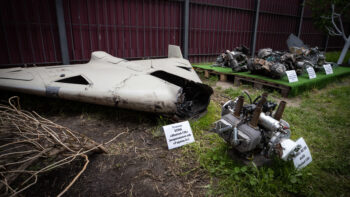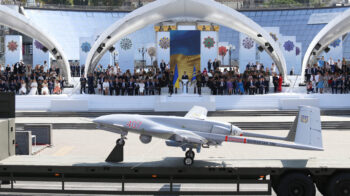
Lockheed Martin’s prototype JLTV
WASHINGTON: The world’s largest arms maker, Lockheed Martin, is about to take the government to court over the contract to replace the Humvee. When the Army awarded the first 17,000 of a projected 55,000 Joint Light Tactical Vehicles to Oshkosh in August, losing bidder Lockheed filed an administrative protest with the Government Accountability Office. But now the company is preparing to escalate to legal action before the Court of Federal Claims. At issue, industry sources tell us, is a trove of documents that the Army — allegedly — withheld until the last minute, at which point GAO refused to consider them.
“Many documents relating to how the award was made were withheld until late in the process,” said Loren Thompson, a well-connected defense industry analyst and consultant who’s worked with Lockheed Martin, among many other companies. “GAO could have extended its review to consider those documents, but it elected not to — leaving the company with legal action as its only recourse to get a full airing of facts in the case.”
Not so, says GAO. Lockheed could have filed a second protest with GAO to cover the late-breaking material, rather than going to court. “We followed the statute,” said Ralph White, GAO’s managing associate general counsel for procurement law “Under the statute, we could have considered a supplemental protest, if Lockheed Martin wanted additional information considered. But they chose not to file one.”
No one’s telling us what the documents actually were, but apparently there were a lot of them. “The volume of documents and data that was provided too late to be considered was a larger quantity than all the other material and data provided previously to Lockheed Martin in the protest period combined,” said another knowledgeable industry source.
This second source summed up the case, anonymously:
“Just before the anticipated GAO decision on JLTV, and well after the GAO’s hearing process was concluded, the US Army came forward with a large volume of documents that had not been produced prior to the hearing. Lockheed Martin believes that this previously undisclosed data would have materially affected the case, including the testimony and cross examination of government witnesses,” the source said. “[But] Lockheed Martin was notified by the GAO that no additional hearings would be conducted, no extension of the deadline would be granted, with the results that the decision would have not taken into account the additional data.”
The GAO may have considered these documents irrelevant, but Lockheed clearly doesn’t. “Lockheed Martin believes the additional documents provide data that will address positions provided by government witnesses before the GAO,” said the industry source, which would call for new hearings and cross-examinations.
What’s more, the source said, “[These] previously undisclosed documents from the US army contain data that Lockheed Martin believes contain additional grounds for protest on the JLTV program.” (Emphasis ours).
In other words, the additional documents don’t just deepen the case, they would broaden it into a wider range of issues. That is, assuming Lockheed’s right. We presume the Army would characterize the documents very differently, and we’ve asked for their comment, but we haven’t had an official reply yet — unsurprising given the legal delicacy of the subject and need to run answers by multiple parts of the Army bureaucracy.
What the Army would say is that they stand by both GAO and JLTV. “We appreciate GAO’s review of the JLTV source selection decision,” said an Army statement. “The program will continue to comply fully with all required processes, and we remain confident that the JLTV program is well positioned to fill a critical capability gap for our Soldiers and Marines while remaining affordable for America’s taxpayers.”
One weird wrinkle in this already unusual case is that Lockheed short-circuited the GAO process just by declaring its intent to go to court. Last Friday, December 11, Lockheed filed a “Notice of Post-Award Bid Protest” with the Court of Federal Claim which is a non-binding declaration of intent to bring legal action. At the time, the GAO process was already ongoing, with a decision due Dec. 17 (tomorrow). But, the GAO announced, “Our Office will not decide a protest where the matter involved is the subject of litigation before a court of competent jurisdiction” (even though in this case the actual legal action hadn’t begun, only the notice of intent). As a result, GAO said, “we are closing our files without further action. The protests are dismissed.”
Another curiosity of the case is that Lockheed is also involved in another major contract battle: Boeing’s protest of the Long-Range Strike Bomber award to Northrop Grumman. That’s a case where Lockheed’s not in the lead, however, and it’s a different division of Lockheed anyway. Loren Thompson, who knows Lockheed’s thinking as well as anyone outside the company’s own C-suite, says “I think it’s just a coincidence, reflecting when two flawed awards were made.”
That said, disgruntled government officials could get the impression that Lockheed is being needlessly difficult — or Congress could get the impression that the Pentagon has dropped the ball on some big programs, yet again.

Oshkosh’s offering for JLTV
Meanwhile on the factory floor, the winning (for now) bidder, Oshkosh, has already received the Army’s order to resume work on JLTV. A contract under protest with the GAO is slapped with a stop-work order — but the Army was so eager to get going again they got that lifted yesterday, the same day GAO made its decision. Oshkosh politely declined to comment on the case. The company’s senior VP for defense programs, John Bryant, has told us previously he thinks the Army ran the competition well and that Oshkosh would be ready to go as soon as the protest was dismissed.
And Oshkosh will be able to keep going, at least for a while. Whereas a protest to GAO automatically invokes a stop-work order, a case before the Court of Federal Claims does not — at least unless Lockheed convinces the court to file a specific injunction to that effect. We’ll keep you posted.
Global interest in Iranian drones unlikely to wane despite failed Israel attack
Though virtually none of the estimated 170 drones Iran launched at Israel got through defenses, analysts told Breaking Defense there’s an eager market globally for Tehran’s relatively cheap, normally effective UAVs.


























